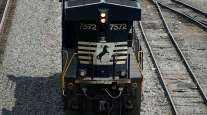AAR Appeals DOT Tank Car Safety Rules
The trade group has asked the Court of Appeals for the District of Columbia Circuit to determine whether DOT violated the Administrative Procedures Act. The railroads, which questioned the effectiveness of those rules, established in May, will be part of a consolidated appeal that also includes the American Petroleum Institute, several environmental groups such as the Sierra Club and communities along rail routes.
DOT intended the rule to reduce accidents and their consequences in light of multiple accidents in the United States and an explosion that killed 47 residents of a small Quebec town. The regulations included specifications for tank car design, speed and routing restrictions and braking systems and routing.
“The petition is being consolidated with the previously filed petitions already pending there by other parties that also have concerns with aspects of the rule,” AAR spokesman Ed Greenberg told TT. “The issues raised by the AAR in this legal challenge track closely with those presented to PHMSA in the administrative appeal.”
Specifically, AAR is challenging the DOT’s decision in four areas, according to court papers. The agency challenged the DOT mandate for electronically controlled pneumatic brakes on some trains, not requiring that some hazardous materials be loaded into railcars meeting the new standards, failing to require thermal and top-fitting safety equipment to protect against accidents and not analyzing the rule’s effect on small railroads.
Earlier this month, DOT turned down the rail group’s appeal. The agency’s Pipeline and Hazardous Materials Safety Administration created the rules, working with the Federal Railroad Administration.
The railroad group questioned whether the ECP brakes, not currently in use on freight trains, are feasible. The railroads also have questioned other provisions due to fears of accidents and liability.




